- Home
- Nick Carter
Night of the Warheads Page 3
Night of the Warheads Read online
Page 3
But again the questions. Who? And where?
The map, a scaled-down version of the area around the Manzanal Mountains in northwestern Spain, was a clue.
"My guess is," Hawk said, "that the map you lifted is the key."
"I agree," Carter said, nodding, "but there is nothing there but wilderness and three tiny villages. I doubt that the Basque terrorists would go to all the trouble of bringing in outside guns to kill a local small-town mayor or police official."
"I think you are right," Ramon Cubanez said. "Although they have done it before, I do not think that is the case now."
The Spaniard had barely finished speaking, when the beeper on his belt went off.
"Let us hope this is it," he said, already heading for the door.
Carter and Hawk stood, silent with their own thoughts, until the man returned.
"We might have it," Cubanez said, beaming. "The target could be Julio Mendez, and the place could be… here!"
Cubanez stabbed a finger at the map in the center of the table.
The young Spaniard's fingernail was resting on a place called Pakolo.
* * *
The sun beat down on the dusty street like a blowtorch from the blue-domed sky.
The intelligence on Pakolo had been right on the nose.
High in the Manzanal Mountains, the tiny village seemed as if it had sprouted from another world, an ancient one. Adobe shacks with tin roofs spread randomly over jagged hills and hung precariously on steep cliffsides.
In the village proper, narrow alleys ran like frightened serpents from the main, dirt street.
The hotel was four tiny rooms above a bar. It fronted what served as the village square. From where Carter sat, sipping thick coffee, a false-fronted line of small stores faced him on the other side of the square. Beyond these, more tin-roofed shacks ambled up a steep hilt to the Catholic church and a small monastery nearby.
The square itself was a fifty-by-fifty area that contained the only grass in sight. In its center sat a statue of some long-forgotten hero, and beside it a small platform had been erected.
It was from this platform that Julio Mendez would make his plea for votes in…
Carter's chronometer read 1140 hours.
In twenty minutes, give or take.
Beneath the light safari jacket, the short-sleeved shirt he wore stuck fast to his skin with perspiration. Sweat also ran freely between the skin of his right leg and the 9mm Luger strapped to it.
Just to the left of the rickety porch where Carter lounged, sat the jeep he and Ramon Cubanez had driven up from Astorga the night before. Beneath its two front jump seats, under a sheet of canvas, was a 9mm Beretta Model 12. The sub was carrying a forty-round feeder, and two more full magazines nestled under Carter's armpits beneath his jacket.
Using that model had been at the instigation of Ramon Cubanez. It was light, 6.6 pounds, short, a little over sixteen inches with the stock folded, and it delivered at 550 rpms for good accuracy up close.
But Cubanez had an even more elemental reason for its use.
"The Model Twelve is popular among terrorists in Spain. If we use them and all does not go according to plan, no one can come down on my government for wanton killing. It will be construed as terrorist faction against terrorist faction."
And therein, as far as they could figure it, was the heart of the caper.
Cubanez's department had pieced everything together once they guessed that Julio Mendez was the target and that the tiny village of Pakolo was to be his place of execution.
The Euzkadi Ta Askatasuna — or ETA — had long been the Basque revolutionary movement for independence from Spain. Recently, the leadership within the ETA had split on philosophy.
One side — headed by Julio Mendez — wanted a halt in the use of terrorism and wanton killing. The other side wanted terrorism in Spain escalated.
Mendez himself had come out of the closet and was legally running for office in the northern Basque provinces.
It was a tricky proposition. A lot of Mendez's people were behind him, but his rivals in the Basque movement wanted him dead. It was also no secret that several high-ranking officers in the Spanish military did not trust him and would also have liked him dead.
Carter lit his tenth cigarette of the day and cast an eye up over his left shoulder toward the second story of the building behind him.
For backup, Cubanez was directly above him in one of the hotel's front comer rooms.
With a second Beretta sub, he could cover the square itself and the main drag and alleys to his left all the way to the end of the village.
They were ready. Carter and Cubanez, even if the Madrid military and the regional Guardia Civil were not.
Through State, Hawk had warned the officials in Madrid that something might be coming down that day in Pakolo.
Beyond giving Mendez two bodyguards, the military had chosen to ignore the warning.
It was as if they truly did want him dead.
Maybe they did.
Latin politics is a strange creature.
But the local version of law and order had listened a little better. His name was Hubanyo, and he had listened to every word Cubanez had said.
This end of Basque country around the Manzanal Mountains was Mendez country, and Hubanyo did not want the people's choice wasted on his turf.
He agreed to every suggestion Cubanez rattled off in the local dialect, including the one Carter was most worried about.
The word went out to every man, woman, and child in the village. When the church bells rang noon to herald Señor Mendez's arrival in Pakolo… stay home!
Now, other than a few stray, yipping dogs, and Hubanyo's two undersheriffs lounging near the speaker's platform, the street was deserted.
Carter breathed a sigh of relief. He did not like including civilians in a war. If the small square in front of him was soon to become a battleground, it was no place for innocent bystanders.
Carter tensed.
From the hills to his right an old, long-bed pickup with high stake sides wheezed around a sloping curve and made its way up the dusty main street.
Just short of the bar it turned left and rumbled its nose into an alley, leaving half the bed sticking into the street. The truck was crated high with fresh produce.
The driver, a swarthy youth of about twenty with long black hair and a sorry excuse for a Pancho Villa mustache, slid from the cab. He moved to the truck's rear and, after lowering the tailgate, began stacking crates of produce on it.
Market day? To take advantage of the crowd coming to hear Mendez speak?
Maybe. Maybe not.
Carter relaxed back in his chair, but he kept the driver and the truck in his peripheral vision.
The church bell began a steady hollow clang from its hillside steeple.
The pupils of Carter's gray eyes played pendulum up and down the street.
Would the villagers do as they had been told?
Had all of them gotten the word?
Evidently so.
Nothing moved in the heat-hazed air.
Except the driver of the pickup loaded with produce. He was probably a truck farmer from somewhere deep back in the hills. He would not have gotten the word.
Should Carter tell him?
He was about to push himself out of the chair, when the driver stepped onto the porch and headed his way.
He wore faded and worn blue jeans, a plaid shirt, its tail out and flapping, and a white, wide-brimmed straw hat.
His feet made an odd, thumping sound on the porch boards. Carter saw why. He wore huaraches — woven leather sandals with the soles fashioned from old rubber tire casings.
He was halfway to the door when he stopped, eying Carter.
"Buenos dias."
"Buenos dias," came the reply.
He removed his hat in the peasant manner, reaching behind his head and lifting it from the rear. By so doing, it covered his face for a moment as a sign of respect. The
n he dropped the straw to waist level. This was also a sign of respect, as well as showing that he was unarmed.
"Americano?"
"Si," Carter replied, feeling the familiar itch of caution crawl up his spine as the man rattled off several sentences of garbled Spanish that Carter did not completely understand.
Something was wrong, but Carter could not put his finger on it.
"No comprendo."
The man shrugged. He made a single step toward the bar door and paused again.
"Uno cigarrillo… por favor?"
Carter pulled a pack from his pocket with his left hand and shook one out.
"Gracias, señor,"
Carter nodded and watched the back of the plaid shirt retreat into the bar.
The man looked like a peasant, but something about him was wrong. He had spoken Spanish, not Basque, and yet his Spanish had been oddly accented.
And there was something else, something different that didn't fit.
Before Carter could finger it, the sudden backfire of a car returned his attention to the street. A bent-fendered, barely running 1950 Ford, its black paint gray with dust, lurched and bolted toward the square.
The church bell seemed to peal louder the closer the old car came. This drew Carter's eye for a brief second.
What he saw sent a quick whispered curse from his lips.
A line of eight monks, all in traditional long brown robes, was moving down the hill from the monastery. They trudged, single file, their heads bent, their hands folded over their bellies, directly toward the square.
Damnit, Carter thought. Hubanyo had screwed up. The monks on the hill had not been told!
He sat upright in the chair as the old Ford reached the edge of the square and rattled to a halt. The two deputies who had been lounging against the speaker's platform moved toward it. At the same time, the huge, potbellied bulk of Hubanyo himself emerged from one of the false-fronted stores on the other side of the Ford. He toted a shotgun cradled in his fat arms, and his black eyes leaped up and down the empty streets.
But he did not see the monks descending the hill behind him.
The bottom half of Carter's right trouser leg had been split and then Velcroed together for easy access to his ever faithful Luger, Wilhelmina. As the two rear doors of the Ford opened, he slid a finger into the Velcro at the top of the slit.
A tall, reed-thin man with angular features and receding gray hair unwound from the back of the sedan on Hubanyo's side.
A small, uniformed man with sleepy eyes and lethargic movements stepped from the Ford on Carter's side.
Carter mentally cursed.
This sorry excuse for a soldier was obviously the bodyguard Madrid had provided Mendez. He looked like a leftover from Franco's era and, as such, probably hated Julio Mendez and everything the man stood for, then and now.
The driver was pushing seventy, also no help. He was already leaning his head back against the seat as if he were headed directly for siesta.
The two deputies had reached Mendez's "bodyguard." Hubanyo was talking to Mendez, gesturing toward the small building behind him and shaking his head from side to side.
If it was going down, it would be soon now.
There was a tiny ripping sound as Carter's finger began opening the Velcro.
Call it déjà vu or call it the sixth sense of the trained operative, the survival instinct that had kept Killmaster N3 alive through many missions.
Or call it the reality of what was: a slight rocking of the old pickup, the monks shifting from single file to fan out in their movement.
And the thump of a rubber-soled footstep on the porch behind him.
The driver.
Carter was no language expert, but he knew a little of the local dialect, and Cubanez had taught him more in their short time together.
The driver had definitely spoken Spanish, but it suddenly hit Carter that it was neither the local dialect nor even decent peasant Spanish.
It was Mexican Spanish.
And then he remembered the huaraches… Mexican peasant shoes.
If a Mexican wanted comfortable footwear to do a big job, he might very well wear what he was most accustomed to…
Carter ripped the Velcro all the way and filled his hand with the Luger. At the same time, he lurched to the right, out of the chair, and rolled in the air.
The young driver, a toothy grin spreading his mahogany face, stood in the bar's doorway. His arms were straight out from his body, his hand holding an already barking.357.
The magnum's slugs made kindling out of the chair back Carter had just vacated.
Carter's back hit the porch just as Wilhelmina exploded. It threw his aim off slightly, but it was still a hit.
The slug thudded into the guy's left hip bone, spinning him around. He hit the wall belly first, staining a good chunk of the faded whitewash with his gore before turning again for a second try at the rolling figure.
Carter squeezed off two rounds: one dead center into the guy's gut, the other a head shot.
The magnum flew from his hands as if on invisible strings, and he was flattened against the wall. He was faceless and his belly was belching blood.
Carter rolled to his belly on the porch, the Luger in his outstretched hands.
All hell had busted loose around him.
Three gunmen had erupted from the bed of the pickup. They all held barking semiautomatic rifles. Their fire was witheringly directed at Hubanyo and Mendez, but most of it was doing nothing more than making scrap out of the Ford.
Carter look in all the rest of the dusty scene in a split second.
The eight monks were each on one knee. From beneath their robes they had produced everything from Brownings to.357s.
Hubanyo had wrestled Mendez three-quarters of the way to the buildings, so they were out of the monks' line of fire.
The two deputies and the bodyguard had not been so lucky.
The uniformed man lay next to the Ford, his body cut nearly in half. One of the two deputies had made it back to the speaker's platform, where he now lay throwing a little fire — when he could raise his head — toward the pickup. The other deputy had been hit in the right leg and was under the Ford, partially shielded by the front wheels.
He wouldn't last long. Carter thought.
It had all happened fast. Maybe ten seconds. And it was happening faster.
Cubanez had already opened up on the monks, dropping two of them with fast fire from the Galil. The others were hustling to positions behind the stores and nearby rocks.
The three in the rear of the pickup had been so intent on trying to nail Mendez that they had not noticed that their buddy had failed to waste the Americano on the porch.
Carter dived through the door of the bar and scuttled across the large room. Near the rear he found a window. When it would not open, he kicked it out, frame and all, with his booted foot.
He dived through, headfirst. Hitting the dust with his shoulder, he rolled and came up on his feet like a cat, the Luger ready to blow hell out of whomever its dark, deadly snout could find.
Through the windshield and the rear window of the truck, he could see them. All three were still intent on the square.
Carter was halfway to the truck when one of them rolled over the bed and headed for the cab.
His intent was obvious; he would move the pickup out and make it a rolling tank.
He saw Carter just as he stepped on the running board. He was toting an M-16, but he saw his executioner too late to bring it into play.
In mid-stride Carter pumped two from the Luger into his chest. Cloth ripped, blood spread, and the slugs exited, fanning the air behind with flesh.
He had barely toppled out of sight when Carter leaped up onto the hood. His belly hit, and his legs curled. The heavily ridged soles of his boots caught, and he was lying belly-out across the roof.
He fanned Wilhelmina from left to right, sending 9mm steel jackets into the backs of their skulls.
&n
bsp; One quick eyeball gave him the situation.
Fire was still coming from behind the rocks to the side of the stores. The monks there could not fire into the front doors and windows, but they could keep anybody inside from coming out.
Cubanez was doing a good job of keeping them pinned down with his Model 12.
Firing from the rear of the stores told Carter that the rest of the monks were around there, probably massing for an assault on the rear door.
The two men he had just sent to hell had been firing an Enfield and an old Garand.
Leathering the Luger, he jackknifed off the roof and slid into the cab.
The old engine coughed and sputtered a couple of times but finally caught. When Carter was sure it was running — and would stay that way — he floored it and jammed the shift into first.
The alley was narrow. So much so that, deeper in, the fenders scraped the sides of adobe huts. Steel screamed against hard-packed mud, but Carter did not let up.
He shifted, closed his ears to the engine's screams of protest, and burst into the open at the rear of the bar.
Two hard rights brought him to another alley that led him back to the front of the bar and the square.
Again the alley was too narrow. A fender let go with a piercing shriek of metal and flew over the top of the cab.
The nose of the old truck had barely cleared the front of the alley when slugs from behind the rocks stitched the windshield.
Shattered glass sprayed across Carter's chest and shoulders but did little harm. He was already lying prone across the seat, one foot to the floor, one hand driving toward the jeep from memory.
When he was sure he had cleared the other vehicle by at least a few feet, he cranked the truck around, lifted his foot from the accelerator, and stomped the brake with both feet.
Tricky? Yes, but he had walked the ground for hours that morning and figured he could gauge the distance from memory.
The old pickup teetered on its nose and then two wheels. Just as it started to go over, Carter gave it up.
He slithered, belly down, out the passenger side. His right hand partially broke his fall just before he tucked, rolled, and came up in a crouch.

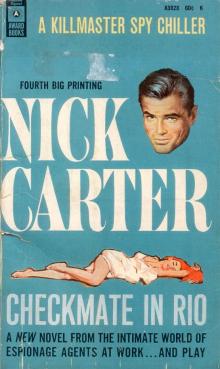 Checkmate in Rio
Checkmate in Rio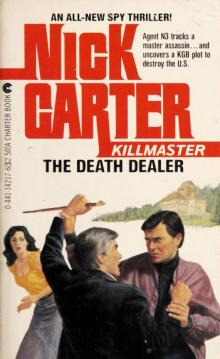 The Death Dealer
The Death Dealer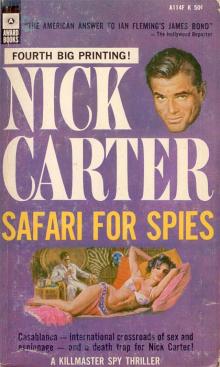 Safari for Spies
Safari for Spies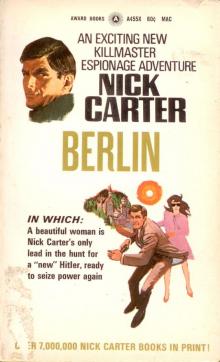 Berlin
Berlin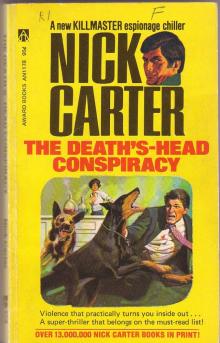 The Death’s Head Conspiracy
The Death’s Head Conspiracy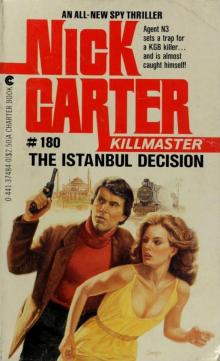 The Istanbul Decision
The Istanbul Decision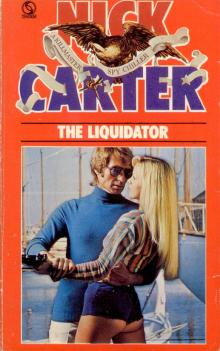 The Liquidator
The Liquidator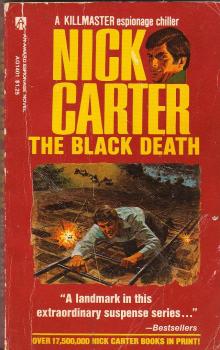 The Black Death
The Black Death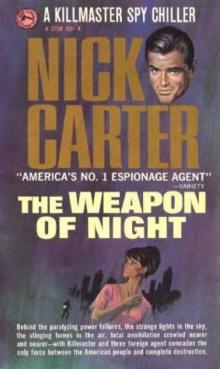 The Weapon of Night
The Weapon of Night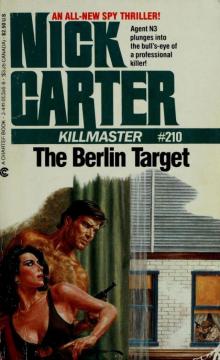 The Berlin Target
The Berlin Target Temple of Fear
Temple of Fear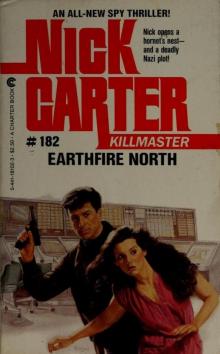 Earthfire North
Earthfire North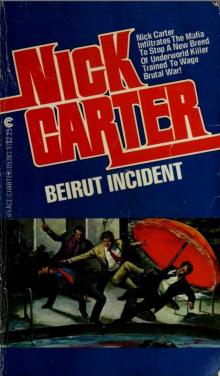 Beirut Incident
Beirut Incident White Death
White Death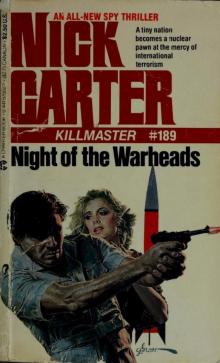 Night of the Warheads
Night of the Warheads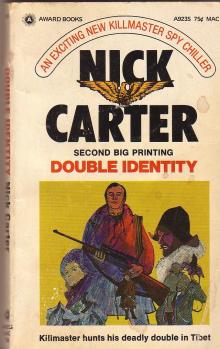 Double Identity
Double Identity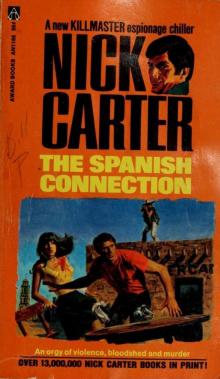 The Spanish Connection
The Spanish Connection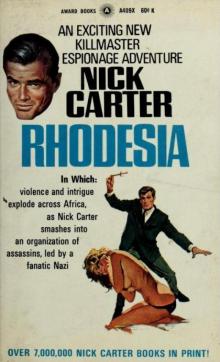 Rhodesia
Rhodesia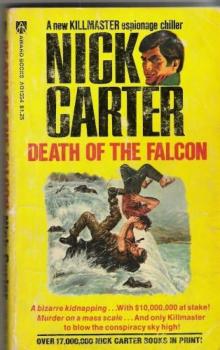 Death of the Falcon
Death of the Falcon The Executioners
The Executioners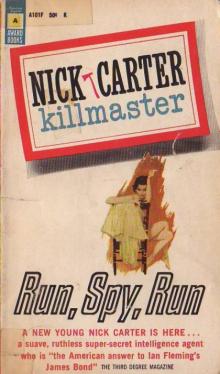 Run, Spy, Run
Run, Spy, Run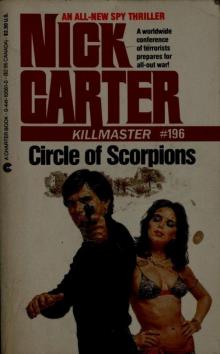 Circle of Scorpions
Circle of Scorpions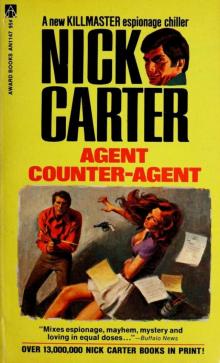 Agent Counter-Agent
Agent Counter-Agent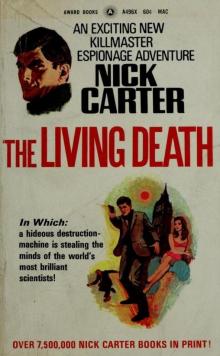 The Living Death
The Living Death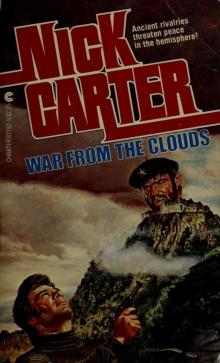 War From The Clouds
War From The Clouds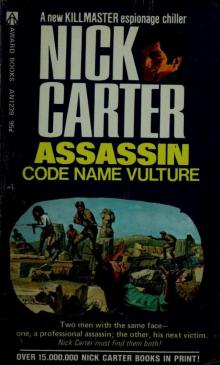 Assassin: Code Name Vulture
Assassin: Code Name Vulture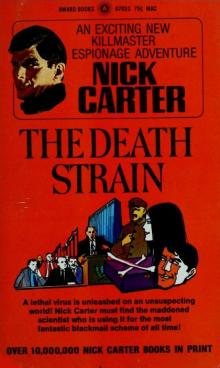 The Death Strain
The Death Strain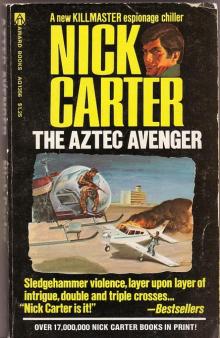 The Aztec Avenger
The Aztec Avenger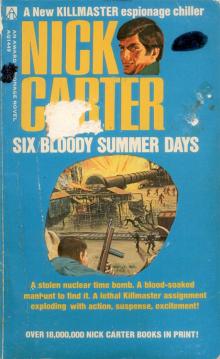 Six Bloody Summer Days
Six Bloody Summer Days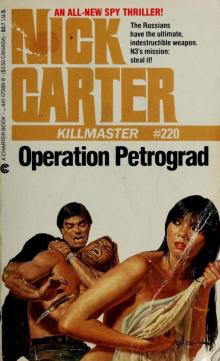 Operation Petrograd
Operation Petrograd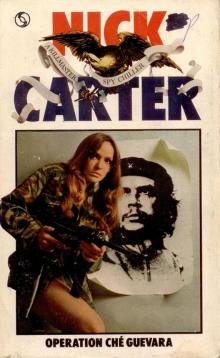 Operation Che Guevara
Operation Che Guevara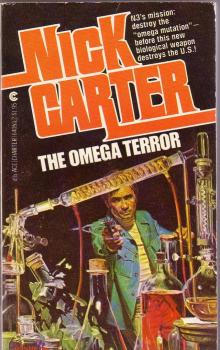 The Omega Terror
The Omega Terror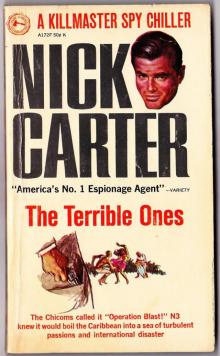 The Terrible Ones
The Terrible Ones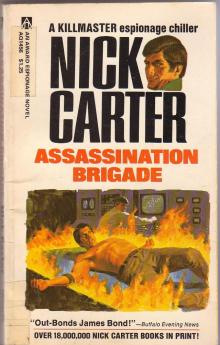 Assassination Brigade
Assassination Brigade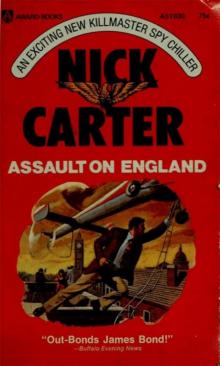 Assault on England
Assault on England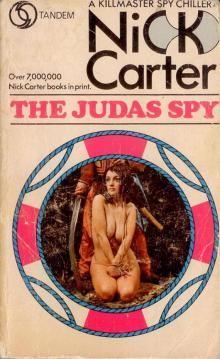 The Judas Spy
The Judas Spy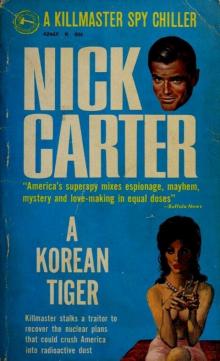 A Korean Tiger
A Korean Tiger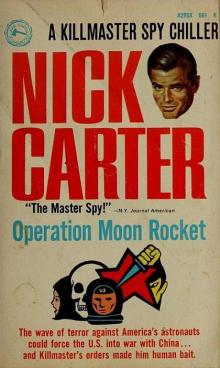 Operation Moon Rocket
Operation Moon Rocket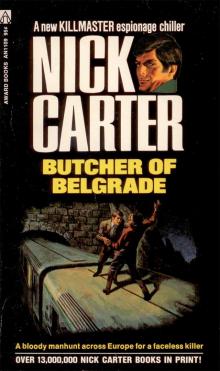 Butcher of Belgrade
Butcher of Belgrade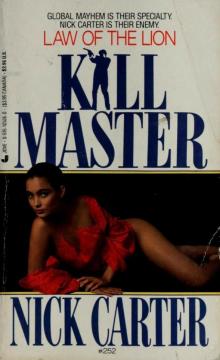 Law of the Lion
Law of the Lion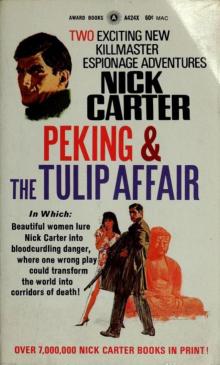 Peking & The Tulip Affair
Peking & The Tulip Affair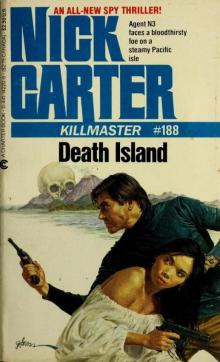 Death Island
Death Island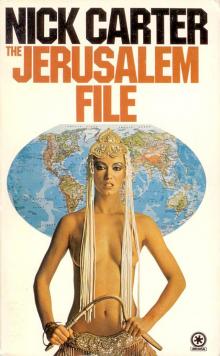 The Jerusalem File
The Jerusalem File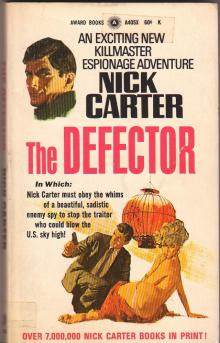 The Defector
The Defector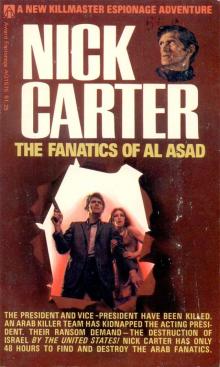 The Fanatics of Al Asad
The Fanatics of Al Asad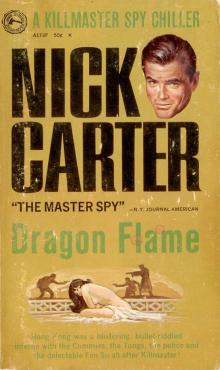 Dragon Flame
Dragon Flame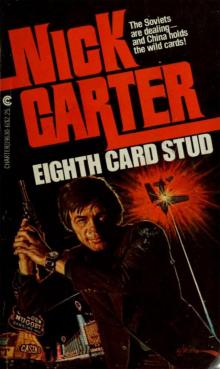 Eighth Card Stud
Eighth Card Stud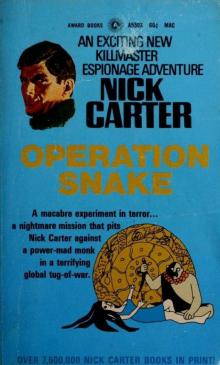 Operation Snake
Operation Snake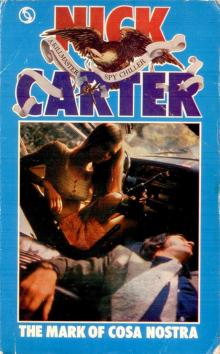 The Mark of Cosa Nostra
The Mark of Cosa Nostra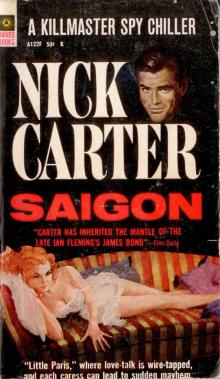 Saigon
Saigon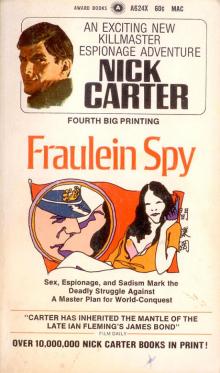 Fraulein Spy
Fraulein Spy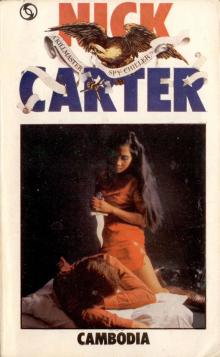 Cambodia
Cambodia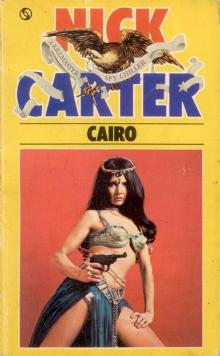 Cairo
Cairo